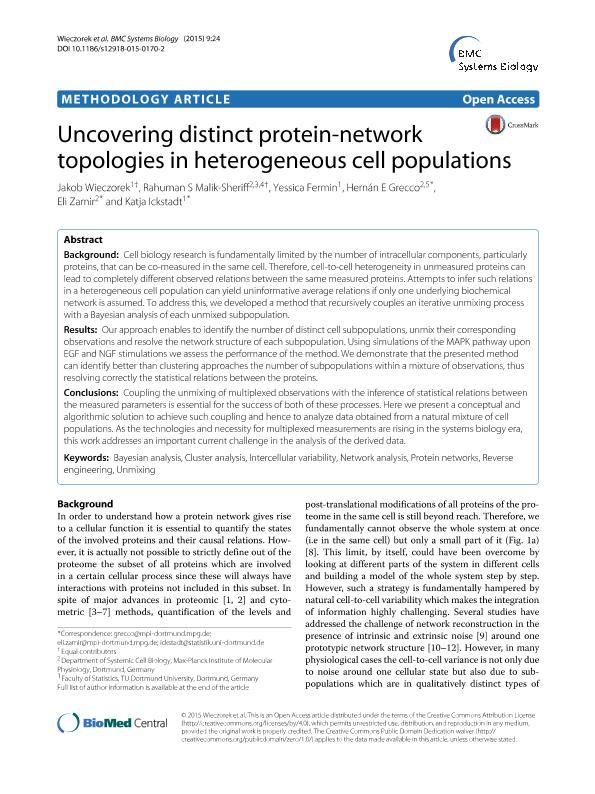Mostrar el registro sencillo del ítem
dc.contributor.author
Wieczorek, Jakob
dc.contributor.author
Malik Sheriff, Rahuman S.
dc.contributor.author
Fermin, Yessica
dc.contributor.author
Grecco, Hernan Edgardo

dc.contributor.author
Zamir, Eli
dc.contributor.author
Ickstadt, Katja
dc.date.available
2018-05-28T14:47:26Z
dc.date.issued
2015-06
dc.identifier.citation
Wieczorek, Jakob; Malik Sheriff, Rahuman S.; Fermin, Yessica; Grecco, Hernan Edgardo; Zamir, Eli; et al.; Uncovering distinct protein-network topologies in heterogeneous cell populations; BioMed Central; Bmc Systems Biology; 9; 24; 6-2015; 1-12
dc.identifier.issn
1752-0509
dc.identifier.uri
http://hdl.handle.net/11336/46228
dc.description.abstract
Background: Cell biology research is fundamentally limited by the number of intracellular components, particularly proteins, that can be co-measured in the same cell. Therefore, cell-to-cell heterogeneity in unmeasured proteins can lead to completely different observed relations between the same measured proteins. Attempts to infer such relations in a heterogeneous cell population can yield uninformative average relations if only one underlying biochemical network is assumed. To address this, we developed a method that recursively couples an iterative unmixing process with a Bayesian analysis of each unmixed subpopulation. Results: Our approach enables to identify the number of distinct cell subpopulations, unmix their corresponding observations and resolve the network structure of each subpopulation. Using simulations of the MAPK pathway upon EGF and NGF stimulations we assess the performance of the method. We demonstrate that the presented method can identify better than clustering approaches the number of subpopulations within a mixture of observations, thus resolving correctly the statistical relations between the proteins. Conclusions: Coupling the unmixing of multiplexed observations with the inference of statistical relations between the measured parameters is essential for the success of both of these processes. Here we present a conceptual and algorithmic solution to achieve such coupling and hence to analyze data obtained from a natural mixture of cell populations. As the technologies and necessity for multiplexed measurements are rising in the systems biology era, this work addresses an important current challenge in the analysis of the derived data.
dc.format
application/pdf
dc.language.iso
eng
dc.publisher
BioMed Central

dc.rights
info:eu-repo/semantics/openAccess
dc.rights.uri
https://creativecommons.org/licenses/by/2.5/ar/
dc.subject
Bayesian Analysis
dc.subject
Cluster Analysis
dc.subject
Intercellular Variability
dc.subject
Network Analysis
dc.subject
Protein Networks
dc.subject
Reverse Engineering
dc.subject
Unmixing
dc.subject.classification
Biología Celular, Microbiología

dc.subject.classification
Ciencias Biológicas

dc.subject.classification
CIENCIAS NATURALES Y EXACTAS

dc.title
Uncovering distinct protein-network topologies in heterogeneous cell populations
dc.type
info:eu-repo/semantics/article
dc.type
info:ar-repo/semantics/artículo
dc.type
info:eu-repo/semantics/publishedVersion
dc.date.updated
2018-05-04T21:30:55Z
dc.journal.volume
9
dc.journal.number
24
dc.journal.pagination
1-12
dc.journal.pais
Reino Unido

dc.journal.ciudad
Londres
dc.description.fil
Fil: Wieczorek, Jakob. Universitat Dortmund; Alemania
dc.description.fil
Fil: Malik Sheriff, Rahuman S.. Institut Max Planck fur Molekulare Physiologie; Alemania. Imperial College London; Reino Unido. European Bioinformatics Institute. European Molecular Biology Laboratory; Reino Unido
dc.description.fil
Fil: Fermin, Yessica. Universitat Dortmund; Alemania
dc.description.fil
Fil: Grecco, Hernan Edgardo. Consejo Nacional de Investigaciones Científicas y Técnicas. Oficina de Coordinación Administrativa Ciudad Universitaria. Instituto de Física de Buenos Aires. Universidad de Buenos Aires. Facultad de Ciencias Exactas y Naturales. Instituto de Física de Buenos Aires; Argentina. Institut Max Planck fur Molekulare Physiologie; Alemania
dc.description.fil
Fil: Zamir, Eli. Institut Max Planck fur Molekulare Physiologie; Alemania
dc.description.fil
Fil: Ickstadt, Katja. Universitat Dortmund; Alemania
dc.journal.title
Bmc Systems Biology

dc.relation.alternativeid
info:eu-repo/semantics/altIdentifier/doi/http://dx.doi.org/10.1186/s12918-015-0170-2
dc.relation.alternativeid
info:eu-repo/semantics/altIdentifier/url/https://bmcsystbiol.biomedcentral.com/articles/10.1186/s12918-015-0170-2
Archivos asociados
